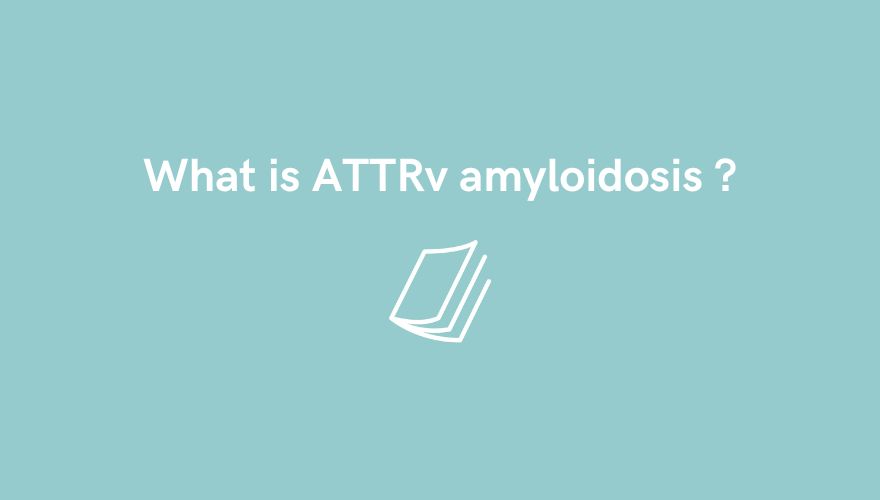Amyloidosis is a group of rare diseases characterised by the abnormal deposition of amyloid proteins (proteins that misfold or twist to form “amyloid fibrils”) in various organs and tissues of the body, leading to their dysfunction and potentially fatal consequences. Hereditary transthyretin-mediated amyloidosis (ATTRv) is one subtype of amyloidosis that affects the heart, nerves, and gastrointestinal tract, among other organs. But in more detail: what is ATTRv amyloidosis? What are its symptoms? What are its impacts? How is it diagnosed? What are the treatment options? In this article, we will try to answer all these questions based on the opinion of Dr Simon Gibs given in the article : https://bit.ly/41Da2KO
What is ATTRv?
Amyloidosis is inherited in about 5% of amyloidosis patients – most often these patients have what we call ‘ATTRv’, also known as hATTR (the ‘h’ standing for ‘inherited’). The “A” refers to amyloid, the “TTR” to transthyretin, which is the misfolded protein, and the small “v” stands for “variant”, because patients with this disease have an inherited variant of the gene that makes TTR proteins.
As it is an inherited disease, other family members may also be affected. This can be psychologically difficult for patients, as they have often seen a parent or relative become ill. This variant of amyloidosis affects about 50,000 people worldwide.
Symptoms and Impacts
ATTRv involves the patients’ heart and carpal tunnels, but it also is more likely to involve the nerves. As a result, patients affected by this disease are more likely to have poor appetite, irregular bowel habits, dizziness, and weight loss, as well as pain or cramps, numbness, tingling, burning and “electric shock” sensations in the legs. In addition, because of the impact of amyloidosis on the heart, other symptoms that patients may experience are shortness of breath, inability to sleep properly, severe fatigue, decreased appetite and severe ankle swelling.
Over time and as the disease progresses, some patients may find it difficult to walk. They may also lose muscle strength, become very thin and suffer from alternating diarrhea and constipation. The disease can therefore seriously affect the patient’s quality of life by impacting on his or her ability to work and have a social life. It can even become physically disabling.
Diagnosis of ATTRv
Diagnosis of ATTRv is often challenging due to the wide range of symptoms and the rarity of the disease. However, early diagnosis is crucial for patients to receive timely treatment and avoid irreversible organ damage. Diagnosis typically involves a combination of genetic testing, clinical evaluation, and imaging studies such as echocardiography and magnetic resonance imaging (MRI).
To avoid this delay in diagnosis, Dr Simon Gibs, chairman of the Australian Amyloidosis Network (AAN), explains that the main mission of the AAN is to raise awareness of the disease in the country. The AAN aims to educate doctors, to raise awareness that ATTRv is not as rare as people think, to highlight effective treatments and to let people know that there are specialists who are interested in this area.
Treatment Access
There are currently two FDA-approved treatments for ATTRv: Inotersen and Patisiran. These treatments can slow the progression of the disease and improve the quality of life of patients. These and other treatments are effective – they are not curative, but they do slow things down. But they can be extremely expensive, and patients may not have access to them.
At AAN, the motto is “Working together to find a cure”. They ensure that they are advocating for their patients by :
- attracting good clinical trials to Australia
- promoting compassionate access programs
- working with pharmaceutical companies to ensure that their medicines are marketed at a reasonable price
- lobbying the government to pay for the drugs
- and so on
Unmet Patient Needs
There are still significant unmet patient needs in the management of ATTRv. Many patients face long delays in diagnosis, limited access to specialized healthcare providers, and inadequate support for managing the disease’s psychological and social impacts. Additionally, more research is needed to develop new treatments and better understand the disease’s underlying mechanisms.
Furthermore, one of the major problems in holistic care is nutrition. If amyloid infiltrates the nerves of the stomach, it can prevent the stomach from relaxing and thus giving the stomach the ability to empty. Thus, breakfast may not have been digested by dinner time. The ANN believes that every patient with ATTRv probably needs a dietician to optimize their food intake and ensure that weight loss is minimized.
ATTRv is a rare and debilitating genetic disease that can significantly impact a patient’s quality of life. Early diagnosis and access to appropriate treatment are crucial for managing the disease and improving patient outcomes.

